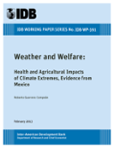Weather and Welfare: Health and Agricultural Impacts of Climate Extremes, Evidence from Mexico
Date
Feb 2013
Using data for all 2,454 municipalities of Mexico for the period 1980-2010, this paper analyzes the relationship between exposure to extreme temperatures and precipitation and death, as well as the relationship between severe weather and agricultural income and crop production in the country. It is found that extreme heat increases mortality, while the health effect of extreme cold is generally trivial. Precipitation extremes seem to affect the agricultural system, but their impact on mortality is ambiguous. More specifically, exchanging one day with a temperature of 16-18 °C for one day with temperatures higher than 30 °C increases the crude mortality rate by 0. 15 percentage points, a result robust to several model specifications. It is also found that the extreme heat effect on death is significantly more acute in rural regions, leading to increases of up to 0. 2 percentage points vis-à-vis a 0.07-point increase in urban areas. The timing of climate extremes is relevant: if a weather shock takes place during the agricultural growing season, the effects on mortality and agricultural output, productivity, prices, and crop yields are large and significant, but not so if such shocks occur during the non-growing season.



